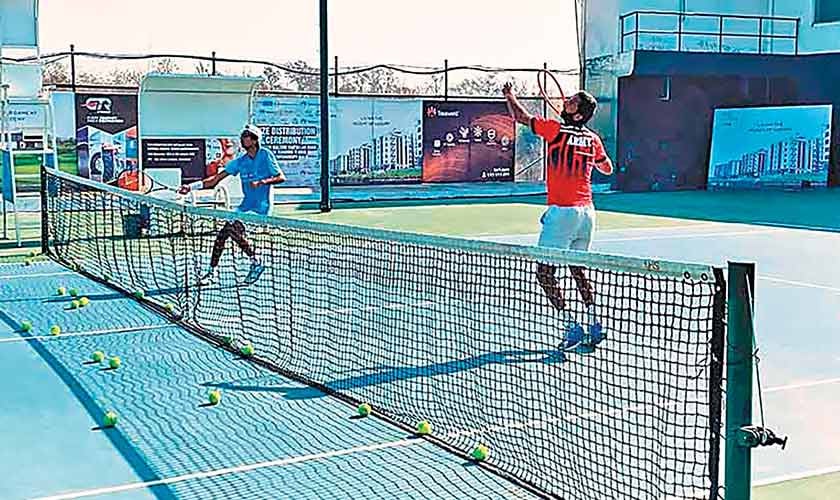Pakistan Suffers Another Defeat in Davis Cup, This Time at the Hands of Paraguay
Pakistan has faced yet another setback in the Davis Cup, this time losing to Paraguay. This marks the fourth defeat for Pakistan since 2023. Despite this ongoing losing streak, there appears to be little indication that the Pakistan Tennis Federation (PTF) is alarmed or taking corrective action.
A Pattern of Inaction Amidst Repeated Defeats
The continuous defeats no longer seem to concern the PTF, as no remedial measures have been implemented following these losses. One of the simplest ways to improve performance would be to seriously act upon the reports submitted by the team manager or non-playing captain after each tie. Unfortunately, this has never been the practice at PTF, and there is little hope this will change in the future.
Insights from the Captain’s Report
To understand the deeper issues, it is worth revisiting the captain’s report following the Davis Cup World Group II first-round tie between Pakistan and Barbados in September of last year. The captain, in his correspondence to the then Secretary of PTF (who also accompanied the team during the recent Paraguay tie), outlined broader structural challenges and developmental concerns that continue to hamper Pakistan’s Davis Cup performances.
Key shortcomings were identified, with over-reliance on veteran players highlighted as the top concern. The report detailed a recurring pattern of avoidable mistakes that have contributed to Pakistan’s repeated defeats. Importantly, the captain proposed specific short- and long-term corrective actions deemed essential for the national team to remain competitive at the Davis Cup level.
A Constructive Roadmap Ignored
The report served as a constructive roadmap emphasizing sustainable growth, strategic planning, and generational transition within Pakistan tennis. Sadly, the PTF management never took these recommendations seriously.
The report highlighted several important factors impacting the national team’s performance:
– Concerns over the lack of composure and tactical clarity exhibited by senior players Shoaib and Yousaf against seasoned opponents.
– The risks of continued dependence on aging players, particularly as fitness issues affected performance in doubles matches.
– The necessity of integrating new talent to prevent stagnation and improve team balance.
– The importance of balancing inclusion of younger players with adequate preparation and support to ensure they are competitive, not just participants.
Recommendations for Improvement
In the short term, the captain recommended:
– Holding preparatory training camps on surfaces similar to those expected during ties.
– Increasing younger players’ participation in international ITF Futures and Challenger events to enhance match readiness.
For the long term, the report suggested:
– Gradually phasing out reliance on older players for critical rubbers.
– Grooming younger players even at the expense of short-term results.
– Establishing a national doubles program focused on team chemistry and specialization.
– Integrating modern sports science—including data analytics, injury prevention, and physical conditioning—into the core training framework.
Regrettably, none of these recommendations were taken up by the PTF management, and the federation repeated the same mistakes in the recent tie against Paraguay, resulting in yet another defeat.
The Paraguay Tie: A Reflection of Governance Crisis
According to media reports, Pakistan (ranked 53rd globally) was convincingly defeated 3-1 by Paraguay (ranked 64th) during their World Group II first-round tie on the red clay courts of Asuncion. This loss once again exposes a governance crisis within Pakistan tennis.
Aisam-ul-Haq Qureshi, aged 46 and currently President of PTF, did not hesitate to select himself for the playing squad without any trial. This decision proved costly for the national team. After losing both singles matches on day one, Pakistan’s doubles match—considered their lifeline—was led by veterans Aqeel Khan and Aisam-ul-Haq Qureshi, both well into their forties. Unfortunately, they lost the crucial match, sealing Pakistan’s defeat.
Concerns Regarding Team Selection and Age Factor
The national tennis fraternity has repeatedly voiced concerns about including Aisam and Aqeel in Davis Cup teams given their advancing age. Despite this, the PTF appears indifferent. At 46, Aisam is well beyond his prime tennis years. Moreover, as the PTF President, it is inappropriate for him to select himself as a player for national ties.
In many countries such as India, Australia, or Spain, federation heads serve strictly as administrators. Their responsibilities include securing funding, developing junior player pathways, and appointing capable team captains. In Pakistan, however, these roles blur—the PTF’s top official not only manages but also competes on the court, often at the expense of meritocracy and the federation’s credibility on the global stage. This dual role represents a clear conflict of interest.
Preparation and Selection Issues
Pakistan’s preparation for the Paraguay tie was also problematic. While a grand national camp was held in Islamabad, the official pre-tie training camp took place in Turkey for just four days. However, only Aisam, Aqeel, captain Haseeb Aslam, and the team physiotherapist attended this camp.
Younger squad members Muzammil, Huzaifa, and 15-year-old US-based talent Mikaeel Ali Baig were excluded from the camp, directly affecting their preparation on the demanding red clay surface. This selective approach forced Pakistan to field a team heavily reliant on veterans, while the juniors remained underprepared. On a surface like clay, where preparation is crucial, Pakistan essentially began the tie at a disadvantage.
Additionally, the PTF did not conduct national trials to select junior team members, once again favoring experience over form by recycling veteran players.
A Call for Change
It is high time the Pakistan Tennis Federation recognizes its true role: to nurture talent and effectively manage the sport, rather than to provide playing opportunities for its officials. The current approach has led to repeated failures and damaged the nation’s standing in international tennis.
Without urgent structural reforms, transparent and merit-based selection, and an unwavering commitment to developing the next generation of players, Pakistan’s Davis Cup prospects will remain bleak. The tennis fraternity and the nation deserve better.
https://www.thenews.com.pk/tns/detail/1346809-ptf-does-not-seem-alarmed-or-worried-over-davis-cup-defeats


